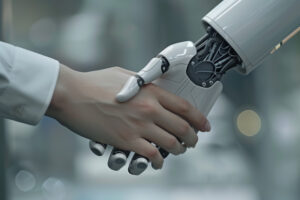- Explore the concept of AI as a moral partner, where technology assists in ethical decision-making and helps build a socio-techno utopia.
- Learn about the benefits and risks of relying on AI for moral judgments, including improved decision-making and the potential loss of human agency.
- Understand the challenges of embedding diverse ethical frameworks into AI and the importance of human-AI collaboration to ensure responsible and transparent use of AI in society.
Introduction: The Vision of AI as a Moral Partner
Artificial Intelligence (AI) is quickly becoming a critical part of modern society, shaping industries and altering how we live and work. Beyond its role in improving efficiency, a new concept is emerging: AI as a moral partner.
This idea suggests that AI could one day assist humans in making ethical decisions, blending its computational power with human values to create a socio-techno utopia.
But is this vision truly achievable? Can AI be trusted to take on the complex responsibility of moral decision-making? This article explores the concept of AI as a moral partner, its potential benefits, ethical challenges, and whether a future where AI helps shape human ethics is a utopia worth pursuing.
Defining AI as a Moral Partner
At its core, AI as a moral partner means more than just assisting with technical problems. It involves AI making or helping humans make ethical decisions based on data analysis, logical reasoning, and pre-programmed ethical frameworks.
For example, autonomous vehicles must make split-second decisions to avoid accidents. In healthcare, AI is already being used to assist doctors in determining patient priorities or even suggesting treatments based on outcomes. The goal is not for AI to replace human judgment but to offer another layer of support in ethical dilemmas.
Potential areas where AI could assist in moral decision-making include:
- Justice systems: AI could help eliminate bias in legal rulings.
- Healthcare: AI could assist in determining the fairest use of limited resources.
- Environmental policy: AI could analyze global data to guide policies on climate change, ensuring a balance between economic and environmental needs.
The Benefits of AI as a Moral Partner
AI’s ability to process large amounts of data gives it significant potential to enhance decision-making, particularly when human biases might cloud judgment. Here are some key benefits of AI as a moral partner:
- Improved decision-making: AI can offer data-driven insights into ethical decisions, from climate change policies to resource allocation in healthcare. AI can assess millions of data points quickly, helping decision-makers consider all available options.
- Bias reduction: Human biases, whether unconscious or overt, can skew moral decisions. AI could help reduce this bias, particularly in sensitive areas like hiring, legal rulings, or healthcare. For instance, in judicial sentencing, AI could recommend more consistent rulings based on patterns in case law, mitigating the risk of bias.
- Consistency: Unlike humans, who might allow emotions or external factors to influence decisions, AI can apply ethical frameworks consistently. For example, in healthcare, AI could suggest treatment priorities during a crisis, ensuring that decisions align with predefined ethical principles, like maximizing overall health outcomes.
- Global perspective: AI can process and integrate global datasets, helping policymakers make ethical decisions that consider the wellbeing of people across different regions, socioeconomic classes, and cultures.
Ethical Frameworks and Algorithms: Can AI Truly Be Moral?
While AI has the potential to assist in moral decision-making, there is a fundamental question: Can AI truly understand morality, or is it just following programmed instructions?
- Rule-based ethics: Some argue that AI could follow strict ethical rules (like deontology), making decisions based on fixed principles such as “do no harm.”
- Outcome-based ethics: Others suggest AI could operate on utilitarian principles, aiming for the greatest good for the greatest number.
- Cultural and contextual ethics: The challenge here is that ethics are not one-size-fits-all. Moral values vary greatly between cultures and even between individuals within the same society. Embedding diverse ethical views in AI systems is complex, especially when decisions must be made in milliseconds.
Moreover, current AI systems process information without truly understanding it. They rely on patterns, probability, and computation rather than true comprehension.
This raises concerns about how reliable AI could be when making moral decisions involving emotional and cultural nuances.
For example, in healthcare, should an AI recommend withholding expensive treatments from terminally ill patients to save resources for others? While such a decision might make logical sense based on utilitarian ethics, it could conflict with the values of empathy and compassion. This highlights a key limitation: AI cannot truly understand the human experience, and its decisions, no matter how well-intentioned, may fall short of what we deem ethically acceptable.
The Risks and Dystopian Possibilities
While the potential benefits of AI as a moral partner are significant, the risks are equally important to consider.
- Over-reliance on AI: There is a danger that humans could become too dependent on AI for moral decision-making, losing their own ethical judgment. For example, the use of autonomous drones in warfare raises concerns about dehumanizing critical life-and-death decisions.
- Loss of human agency: If we allow AI to take over moral decision-making in areas like justice or healthcare, it could erode human responsibility. The question arises: Do we risk losing our humanity by outsourcing ethical decisions to machines?
- AI Bias and Error: Despite their promise, AI systems are not infallible. They are only as good as the data they are trained on. If that data is biased, the AI will be too. This has already been seen in cases where AI systems, trained on biased data, have made discriminatory decisions in policing or hiring.
- Ethical transparency: One of the biggest challenges with AI is the so-called “black box” problem. Even the developers of advanced AI systems often don’t fully understand how the AI reaches its decisions. This lack of transparency could be dangerous in scenarios where AI makes moral decisions without explaining its reasoning.
Human-AI Collaboration: The Hybrid Utopia
Given the risks and limitations, the most realistic and ethical way forward might be a hybrid model where AI supports human moral decision-making rather than replaces it.
- AI as an assistant: In healthcare, AI could assist doctors by analyzing vast amounts of medical data, offering recommendations for treatment while leaving the final decision to the healthcare professional.
- Empowering human moral capacity: AI could enhance human decision-making by providing data-driven insights, helping people consider ethical dilemmas from multiple angles.
- Co-evolution of human and AI morality: As AI continues to develop, our own ethical systems may evolve to meet the challenges of a more technologically integrated world. Human oversight and accountability will be crucial in ensuring that AI continues to serve humanity’s best interests.
The Path Forward: Building a Socio-Techno Utopia
Creating a socio-techno utopia where AI serves as a moral partner requires careful planning and ethical governance. Here are key steps toward making this vision a reality:
- Developing ethical governance frameworks: Policymakers, ethicists, technologists, and global institutions must work together to shape the ethical use of AI.
- Ensuring transparency: It’s vital that AI’s decision-making processes are explainable and auditable, allowing humans to understand and challenge its reasoning when necessary.
- Fostering diversity: AI ethics should not be defined by a small group of technologists. Diverse cultural, social, and philosophical perspectives must be included to ensure that AI is ethically inclusive.
- Education and public discourse: Public understanding of AI and its ethical implications must grow. Engaging in global discussions about the moral role of AI can help societies make informed choices about how to integrate these technologies.
Final thoughts: Is a Socio-Techno Utopia Worth Striving For?
AI as a moral partner offers immense potential to improve decision-making, reduce bias, and provide global perspectives on ethical issues. However, AI cannot replace human judgment or empathy. The most balanced approach is a hybrid model, where AI assists human ethics without replacing it.
To build a socio-techno utopia, we must ensure that AI is developed with transparency, cultural sensitivity, and human oversight. AI has the potential to support moral decision-making, but it should never override the core of human ethics—our capacity for empathy, compassion, and responsibility. A future where AI and humans collaborate ethically may indeed be a utopia worth striving for.
People Also Ask
How can AI assist in moral decision-making?
AI can assist in moral decision-making by analyzing vast amounts of data, identifying patterns, and providing insights to help humans make more informed ethical decisions. For instance, AI can support judges in legal rulings or doctors in determining patient care priorities.
What are the risks of using AI in ethical decision-making?
The main risks include over-reliance on AI, loss of human agency, potential AI bias, and lack of transparency in decision-making processes. These risks can lead to ethical dilemmas or unintended consequences if not carefully managed.
Can AI be trusted to make moral decisions?
AI can assist in making moral decisions, but it should not be solely trusted to do so. AI lacks the ability to truly understand human emotions and values, and its decisions should be guided by human oversight to ensure they align with societal ethical standards.
What is the “black box” problem in AI ethics?
The “black box” problem refers to the lack of transparency in how AI systems reach their decisions. Often, AI processes are too complex for humans to understand, making it difficult to explain or challenge the outcomes.
Further Reading
The concept of AI as a moral partner offers profound opportunities for transforming ethical decision-making across various sectors, from healthcare to environmental policy. The following books provide a more in-depth exploration of the ethical implications of AI and the potential for its integration into a future socio-techno utopia. These readings offer diverse perspectives on how AI can be responsibly developed and used, delving into moral frameworks, transparency issues, and the complex relationship between human agency and AI’s growing role in society.
The Oxford Handbook of Ethics of AI by Markus Dubber – This book provides a comprehensive look into the ethical challenges surrounding AI. It covers various aspects, including how AI intersects with law, society, and governance, making it a valuable resource for understanding the moral frameworks that could support AI as a moral partner in a future socio-techno utopia.
Moral AI by Jana Schaich Borg, Walter Sinnott-Armstrong, and Vincent Conitzer – This thought-provoking guide dives deep into questions about AI’s capacity for moral decision-making, exploring both the potential and the risks. It is particularly relevant for those interested in how AI can be designed to assist in ethical decision-making without replacing human judgment.
Responsible Artificial Intelligence: How to Develop and Use AI in a Responsible Way by Virginia Dignum – This book explores how to integrate AI into society responsibly, examining the ethical responsibilities of developers and policymakers. It offers a pragmatic approach to embedding AI in social structures while addressing concerns about transparency and bias.









